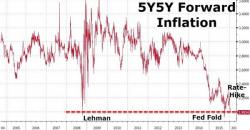Does Buffett See A Bottom In Oil Prices?
Submitted by Rakesh Upadhyay via OilPrice.com,
Warren Buffett has been consistently wrong on oil, but many experts are calling a bottom on oil prices now that the investor extraordinaire has upped his ante in Phillips 66, betting that he can’t be wrong three times in a row.



